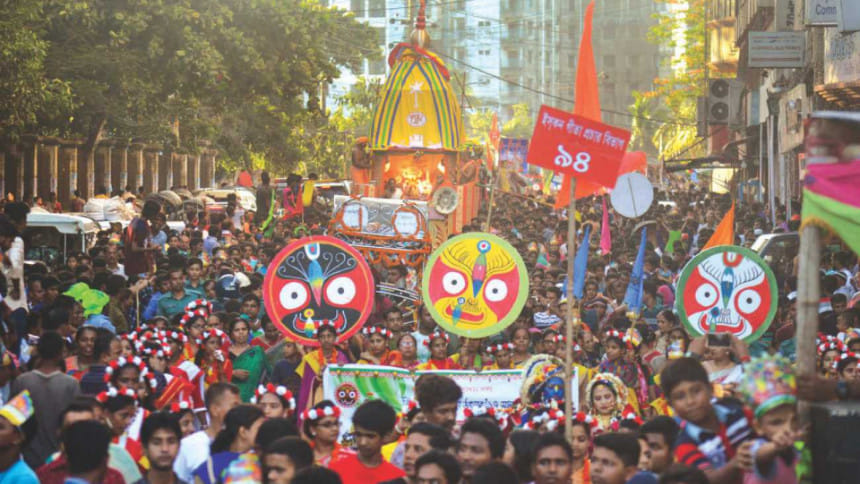Destruction of shops at Rath Mela and the ever-shrinking space for minorities

Last Saturday night, the 400-year-old Rath Mela in Dhamrai, a fair integral to the Hindu Rath Jatra Utsab and the biggest Rath Jatra festival of the country, was shut down by the police over what it called "security concerns", the fair stalls forcibly dismantled, visibly destroyed, and their owners beaten up.
It is disconcerting that this is the first time that the fair has been forced to shut down and the first time since the ceremonial chariot was burnt down by the Pakistan Army in 1971 that an act of violence has been perpetrated at Dhamrai Rath.
The destruction at Dhamrai is simply another manifestation of the systematic persecution of minorities in Bangladesh. It is yet another reminder that the outbreak of violence against minorities is not so much an isolated incident resulting from the cultural anomaly that is religious extremism, but a prevailing attitude that it is woven into the very fabric of civilised society.
Even if these crimes do not have communal motivations and are a show of power resulting from intra-party conflicts between the local parliamentary member MA Maleque and Dhamrai municipal mayor Golam Kabir, as echoed by Nanda Gopal Sen, joint secretary of Shree Shree Joshomadhab Mandir committee, why choose the Rath Mela to vandalise?
In fact, there was already quite a bit of talk about "security concerns" before the Rath Jatra Utsab even began. But then there are always such concerns at large gatherings, in which case security is heightened, be it Pahela Baishakh, the Dhaka International Trade Fair, or the Ekushey Boi Mela. Instead, in a meeting at police headquarters with the organising committees, loudspeakers were banned at the Rath Jatra on the very "logical" grounds that: a) if any criminal activity were to take place in the process, the police would not be able to detect it amid the loud music, and b) loud music also causes disturbances for old people and children. But where were the admonishing sit-downs with the police when mosque loudspeakers in Nasirnagar were used to mobilise a horde to murder a man? But God forbid a Hindu makes a peep! One may wonder what the authorities will have to say about miking come Durga Puja this year.
In an act of protest for having their fair shut down, the organising committee of the Rath Jatra Utsab had decided to cancel Monday's Ulta Rath Jatra. However, another sit-down with the police later, all was forgiven and this act of protest repealed. While celebrating in full fervour is really the biggest middle-finger one can give, it's regrettable that they were promised the extra security they should've been given all along only at the last minute.
But from whom did the celebrators require protection? The local MP says that the followers of the mayor destroyed the makeshift shops, while the mayor denies such allegations and blames the police instead. The local OC says they "closed", not destroyed, the shops, while Dhaka's Additional Police Superintendent Asraful Azim refutes the threat of any possible militant attacks. The only possible conclusion left is that the shops must've self-destructed all on their own.
We go on acting like these so-called "security concerns" are not just an excuse to stifle minorities, as if their numbers have not been dwindling, as if at the rate at which Hindus have been fleeing Bangladesh today is not similar to 1971, as if over 50 indigenous groups are not on the verge of extinction.
Coincidentally, last year Mayor Kabir had allegedly forced the Hindu community at Dhamrai to allow him to set up a cattle market on the temple's land during Qurbani Eid last year. Was there no other place in all of Dhamrai municipality for a cattle market? Of course we are way past the point of expecting the religious sentiments of minorities to be taken into consideration in a country where co-existing has become quite impossible.
The local government and police seem to wear disregard like a badge of entitlement, power, and control. Who really cares if the possessions of a minority community are seized, destroyed, or stolen? They are less human, more subspecies—second class citizens—given there has been no justice for the uncountable transgressions committed against them. If they were equals, would the law have not protected them equally after a hundred Hindu houses and temples were vandalised in Nasirnagar last October? If they were equals, would the law have not protected them before hundreds of their houses had already burned to the ground in Longadu?
Three investigations later, the government can still find no culprit or no motive behind the destruction at Nasirnagar, while at Longadu, the police lost no time arresting Runel and Junel Chakma on the basis of rumours, but are yet to make any developments on the two cases filed against 79 named culprits of the arson attack on the indigenous community.
The past two months have seen the indigenous community in the hill tracts literally hunted down and smoked out of their houses, and a vicious murder attempt on an Ahmadyiya imam. The physical space the minority 10 percent of the population take up is literally shrinking. I will not ask how we got here. Impunity, nominal case-filing, forced extermination, as well as slow, deliberate expulsion, and our collective amnesia may all be to blame, but what dark future awaits a nation where the minutest deviation from the norm is met with violence?

 For all latest news, follow The Daily Star's Google News channel.
For all latest news, follow The Daily Star's Google News channel. 





Comments